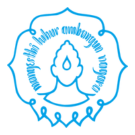The Urgency of Law Enforcement of Illegal Medicine Distributions in Indonesia
Abstract
Background: Medicine plays an important role and is an irreplaceable component in health. World Health Organization (WHO) statistics in 2015 stated that illegal medicine distributions in Indonesia are not less than 3 trillion rupiahs per year or 10 percent of all existing medicine distributions. These findings indicate that law enforcement against criminal acts of illegal medicines distribution is still not adequate. The distribution of illegal medicines including counterfeit medicines is a serious threat to the health of all Indonesian people. This study aimed to analyze the urgency of law enforcement of illegal medicine distribution in Indonesia.
Subjects and Method: This was a qualitative study (descriptive non-doctrinal legal research) conducted in Sragen, Central Java. Five informants consist of the head of Loka BPOM Surakarta, the head of Sragendistric health office, a hospital director, a pharmacist in a community health center, and a pharmacy owner. Data collected by interview, observation, and documentary review. Data were analyzed by data reduction, presentation, and verification.
Results: The investigations of the distribution of illegal medicines are carried out by PPNS from BPOM and accompanied by the police as supervisory coordinators. BPOM has a mapping of facilities and cases, as well as information from the community. If there is sufficient evidence, BPOM applies administrative sanctions, and if there is a criminal sanction, it will continue to other law enforcement officers. The regulations in the field of medicine are adequate, starting from Law number 36 of 2009 concerning Health, government regulations, the minister of health regulations, and BPOM regulations. The distribution of illegal medicines still occurs because there are demands from community and online medicine sales that have not been regulated by the government.
Conclusion: Based on Lawrence M. Friedman’s theory, a legal substance, legal structure, and legal culture are a unity in carrying out law enforcement efforts, meaning that no matter how good a law is if it is not accompanied by a good implementing structure and a supportive culture it will be difficult to enforce the law. The society’s trust in the law enforcement officers in Indonesia that considered low should be restored with some improvement in structural and substantial aspects of law along with the presence of legal culture.
Keywords: medicine, pharmacy, distribution, illegal
Correspondence: Evelina Yuliani. Masters Program in Law, Universitas Sebelas Maret, Jl. Ir. Sutami 36 A, Surakarta 57126, Central Java. Email: eyuliani12@gmail.com. Mobile: 0811285066.
Journal of Health Policy and Management (2019), 4(2): 76-85
https://doi.org/10.26911/thejhpm.2019.04.02.01
How to Cite
References
Ali A (2003). Keterpurukan hukum di Indonesia. Jakarta: Chalia Indonesia.
Ariyulinda N (2018). Urgensi pembentukan regulasi penjualan obat melalui media online. Jurnal Legislasi Indonesia. 15: 37-48.
BPOM (2015). Materi edukasi tentang peduli obat dan pangan aman. Jakarta: BPOM.
BPOM (2017). Penanganan dan pemberantasan obat palsu. Tangerang: BPOM.
BPOM (2018). Rekrut aparat penegak hukum perangi kejahatan obat dan makanan. Press conference March 28th, 2018. Retrieved from http://pom.go.id.
Friedman LM (1975). Legal system, a social science perspective. New York: Russel Sage Foundation.
_____ (1987). Sistem hukum, perspektif ilmu sosial. Translation: M. Khozim. Bandung: Nusa Media.
Head of the Republic of Indonesia Drug and Food Supervisory Agency Decree Number02001/I/SK/KBPOM dated February 26, 2001 concerning the Organization and Work Procedure of the Drug and Food Supervisory Agency Indonesia Criminal Code.
Law Number 36 of 2009 concerning Health
Minister of Health Regulation Number 917 of 1993 concerning Compulsory Medicines.
Minister of Health Regulation Number 9 of 2017 concerning Pharmacy.
Minister of Health Decree Number 1331of 2002 concerning Amendments to the Minister of Health Regulation Number 167 of 1972 concerning Medicines Retailers.
Presidential Instruction Number 3 of 2017 concerning Increasing the Effectiveness of Drug and Food Control.
Raharjo S (1980). Hukum dan masyarakat. Bandung: Angkasa.
_____ (1983). Masalah penegakan hukum. Bandung: SinarBaru.
Soekanto S (1977). Kepatuhan and kesadaran hukum. Jakarta: C.V. Rajawali





